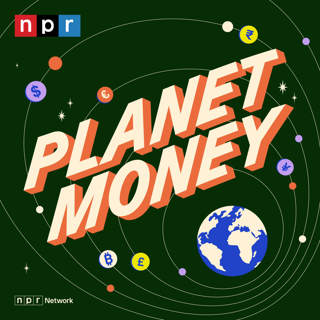
When women stopped coding (Classic)
A lot of computing pioneers were women. For decades, the number of women in computer science was growing. But in 1984, something changed.Subscribe to Planet Money+ in Apple Podcasts or at plus.npr.org/planetmoney.Learn more about sponsor message choices: podcastchoices.com/adchoicesNPR Privacy Policy
7 Des 202217min

My Favorite Tax Loophole
There's a big difference between tax avoidance and tax evasion. But sometimes even avoiding taxes (legally) can feel like you're getting away with something. Today, we share some of our — and your! — favorite loopholes in the U.S. tax code.Subscribe to Planet Money+ in Apple Podcasts or at plus.npr.org/planetmoneyLearn more about sponsor message choices: podcastchoices.com/adchoicesNPR Privacy Policy
3 Des 202226min

Messi economics
Soccer star Lionel Messi is currently hoping to lead Argentina to victory in the World Cup. His path to global fame was shaped by a crisis in Argentina's economy.This episode was made in collaboration with NPR and Futuro Studios's The Last Cup podcast.Subscribe to Planet Money+ in Apple Podcasts or at plus.npr.org/planetmoneyLearn more about sponsor message choices: podcastchoices.com/adchoicesNPR Privacy Policy
1 Des 202227min

One economist's take on popular advice for saving, borrowing, and spending
This episode was first released as a bonus episode for Planet Money+ listeners last month. We're sharing it today for all listeners. To hear more episodes like this one and support NPR in the process, sign up for Planet Money+ at plus.npr.org. Planet Money+ supporters: we'll have a fresh bonus episode for you next week! "Save aggressively for retirement when you're young." "The stock market is a sure-fire long-term bet." "Fixed-rate mortgages are better than adjustable-rate mortgages." Popular financial advice like this appears in all kinds of books by financial thinkfluencers. But how does that advice stack up against more traditional economic thinking? That's the question Yale economist James Choi set out to answer in a paper called Popular Personal Financial Advice Versus The Professors. In this interview, he tells Greg Rosalsky what he found. Their talk marks another edition of Behind The Newsletter, in which Greg shares conversations with policy makers and economists who appear in the Planet Money newsletter. Subscribe to the newsletter at https://www.npr.org/newsletter/money. Read more about James Choi's paper here: https://www.npr.org/sections/money/2022/09/06/1120583353/money-management-budgeting-tipsLearn more about sponsor message choices: podcastchoices.com/adchoicesNPR Privacy Policy
23 Nov 202232min

How the cookie became a monster
30 years ago, Lou Montulli set out to solve a fundamental problem with the internet, and accidentally created an entirely different one. On today's show, how the cookie went from an obscure piece of code designed to protect anonymity, to an online advertiser's dream, to a privacy advocate's nightmare.Subscribe to Planet Money+ in Apple Podcasts or at plus.npr.org/planetmoneyLearn more about sponsor message choices: podcastchoices.com/adchoicesNPR Privacy Policy
19 Nov 202226min

Sam Bankman-Fried and the fall of a crypto empire
Sam Bankman-Fried built a reputation as the one reliable crypto bro. But within the span of days, his empire came crashing down. What the rise and fall of crypto's 30-year-old elder statesman says about the story of crypto so far.Subscribe to Planet Money+ in Apple Podcasts or at plus.npr.org/planetmoneyLearn more about sponsor message choices: podcastchoices.com/adchoicesNPR Privacy Policy
17 Nov 202223min

The E-Book Wars
In 2019, a group of librarians (quietly) stormed the offices of a major publisher, Macmillan, to protest a controversial policy on e-books. On this show, how a tiny change - a book on a screen - threw an industry into war with itself.Subscribe to Planet Money+ in Apple Podcasts or at plus.npr.org/planetmoneyaLearn more about sponsor message choices: podcastchoices.com/adchoicesNPR Privacy Policy
11 Nov 202225min

Peak Sand (classic)
Sand. It's in buildings, windows, your cell phone. But there isn't enough in the world for everyone. And that's created a dangerous black market.Subscribe to Planet Money+ in Apple Podcasts or at plus.npr.org/planetmoneyLearn more about sponsor message choices: podcastchoices.com/adchoicesNPR Privacy Policy
9 Nov 202217min






















